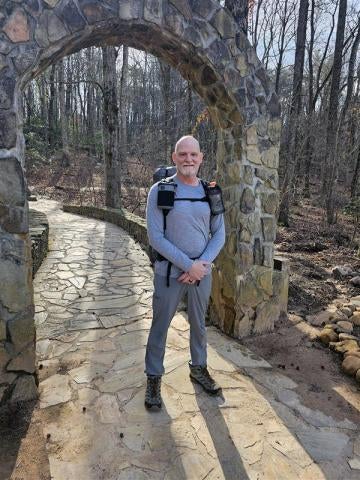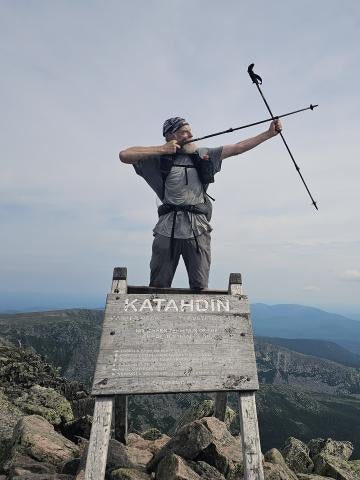From Special Forces to the Appalachian Trail: John Richter’s Journey to Rediscover Himself

When John Richter set out on Feb. 17, 2024, from Springer Mountain, Georgia – the southern terminus of the Appalachian Trail – he wasn’t just chasing miles. He was chasing a deeper connection to the person he used to be.
A veteran of the U.S. Army Special Forces, John spent a decade jumping out of airplanes, training on Alaskan glaciers and mountaineering across Montana. After leaving the military, he transitioned to a new mission: supporting spacecraft mission operations at NASA’s Goddard Space Flight Center (GSFC) and is currently KBR’s Space Science Mission Operations Deputy Project Manager at GSFC. While he found his work rewarding, he missed the intense physical and mental challenges that had once defined his life.
In 2015, after joining his brother-in-law for the final summit of his Appalachian Trail thru-hike, John made himself a promise: “One day, I'm going to do a thru-hike of my own.” Eight years later, thanks to KBR’s sabbatical program and vacation time, John kept that promise – and spent 144 days hiking all 2,197.4 miles of the Appalachian Trail.
John’s hike was no small undertaking. The Trail’s total elevation gain is roughly 464,500 feet – the equivalent of climbing Mount Everest 16 times. Only about 25% of thru-hikers complete the journey each year, typically requiring around six months. John finished in under five, reaching Mount Katahdin, Maine, the northern terminus of the Trail on July 9, 2024.
He carried everything he needed in a backpack that averaged 31 pounds: tent, sleeping bag, water filter, an ultralight stove, a first aid kit, and trail running shoes – going through six pairs by the end. He carried three to five days’ worth of food at a time, resupplying in trail towns along the way.
Each day started around 4:30 a.m. with breakfast cooked at his campsite followed by hours of trekking, navigating steep climbs, rough terrain, cold rain, and even snow. He slept mostly in his tent, relishing the solitude and connection with nature. One of the greatest gifts of his journey was unplugging – no social media, no news, no daily distractions – just the trail, the wilderness and his thoughts.
John turned 57 on the trail, and while he hiked to test his physical endurance, the journey became something even more meaningful. “About halfway through,” he said, “I realized my reason for doing this: to find the me I used to be.” Hiking through freezing temperatures, torrential rains, and the bug-infested stretches of Vermont through Maine, John was determined to prove that his strength and spirit hadn’t dimmed over time.

Some sections, like the notorious Mahoosuc Notch – often called “The toughest mile” on the trail – tested his Special Forces grit. But he remembered a lesson from the military: When things are bad, when things seem hopeless, when you are miserable, when you feel like quitting – don’t! Embrace it. You know it will eventually get better, and when you succeed, you will be a better, stronger person for it.”
Along the way, John met a diverse group of fellow hikers – from a Florida beekeeper to a 68-year-old Bulgarian woman – and forged friendships that continue to this day. He marveled at the beauty of places like the White Mountains of New Hampshire and the lakes and forests of Maine, even as difficult terrain slowed his pace to nine to 12 miles a day in the northern stretches.
His adventure wasn’t just transformative mentally – it was life-changing physically. Before the hike, John had Type 2 diabetes and required daily medication. After burning thousands of calories each day, he returned home 38 pounds lighter and diabetes-free.
John credits KBR’s sabbatical program for allowing him to achieve his dream while he was still in great health. “Without it, I would have had to wait until retirement. I’m grateful I was able to do this now.”
Reflecting on his journey, John calls the experience the greatest adventure, challenge and accomplishment of his life. “I succeeded in finding the me that I used to be – for sure. Living simply, being in nature, and meeting the amazing people I did along the way is something I’ll never forget.”



